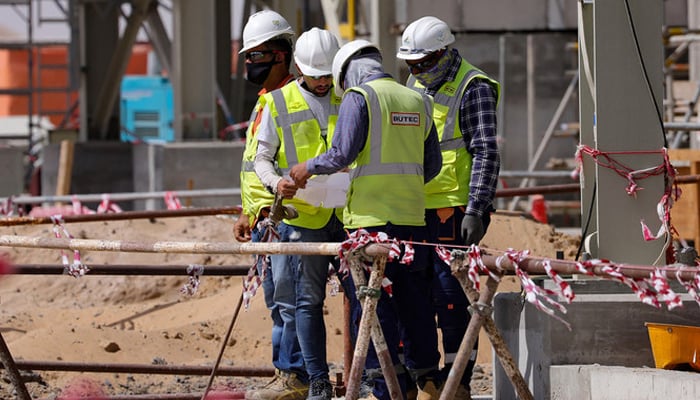Human capital crisis
Pakistan has no vast reserves of oil, gas, or other natural resources that it can count on to turn its present economic woes around. The only resource that the country can count on to build a better future is its people. Ironically, our human resources have arguably been our most neglected and underdeveloped resource. This point has been underscored recently by the World Bank’s Vice President for South Asia Martin Raiser while launching a policy notes series on how Pakistan can improve its development outcomes and build a better future for its people.
Raiser highlighted the fact that around 40 per cent of our children suffer from stunted growth while over 78 per cent are unable to read or understand a simple text by the age of 10 and that this is indicative of “a silent human capital crisis that needs priority attention”.
Sadly, even the slightest bit of effort to remedy these issues can go a long way towards making us a better country. An additional one per cent of GDP per year spent on water and sanitation, combined with better local-level coordination, could cut stunting by 50 per cent over a decade.
The economic and health benefits we are foregoing by choosing not to act on human development are tremendous.
Currently, Pakistan’s Human Capital Index (HCI) value stands at 0.41, as per the World Bank, which is lower than the South Asia average of 0.48 and barely above the Sub-Saharan Africa average of 0.40. To make matters worse, our overall HCI value, while already quite low, masks inequalities between rich and poor, men and women, and urban and rural areas, which have either persisted or widened. Pakistan’s inability to improve the health, education, and economic outcomes of its people holds back the overall economy. A nation without a base of skilled, healthy, and productive workers is unlikely to attract investment or innovate the next game-changing technology. The around 23 million children who are out of school in Pakistan today are a valuable resource that we have failed to develop and, like it or not, our children are the only resource that we in Pakistan have. Negotiating bailouts is only a stop-gap measure that will help keep us afloat in the immediate term. If long-term prosperity is our goal, our government has to come up with a targeted and coherent plan to improve the health, education and overall welfare of our children.
-
 Timothée Chalamet Reveals Rare Impact Of Not Attending Acting School On Career
Timothée Chalamet Reveals Rare Impact Of Not Attending Acting School On Career -
 Liza Minnelli Gets Candid About Her Struggles With Substance Abuse Post Death Of Mum Judy Garland
Liza Minnelli Gets Candid About Her Struggles With Substance Abuse Post Death Of Mum Judy Garland -
 'Saturday Night Live' Star Will Forte Reveals How He Feels About Returning To The Show After 2010 Exit
'Saturday Night Live' Star Will Forte Reveals How He Feels About Returning To The Show After 2010 Exit -
 Police Officer Arrested Over Alleged Assault Hours After Oath-taking
Police Officer Arrested Over Alleged Assault Hours After Oath-taking -
 Prince William Issues 'ultimatum' To Queen Camilla As Monarchy Is In 'delicate Phase'
Prince William Issues 'ultimatum' To Queen Camilla As Monarchy Is In 'delicate Phase' -
 Maxwell Seeks To Block Further Release Of Epstein Files, Calls Law ‘unconstitutional’
Maxwell Seeks To Block Further Release Of Epstein Files, Calls Law ‘unconstitutional’ -
 Winter Olympics 2026: Remembering The Most Unforgettable, Heartwarming Stories
Winter Olympics 2026: Remembering The Most Unforgettable, Heartwarming Stories -
 King Charles Hands All Of Andrew Mountbatten-Windsor’s Records And Files To Police: Report
King Charles Hands All Of Andrew Mountbatten-Windsor’s Records And Files To Police: Report -
 Eric Dane's Family Shares Heartbreaking Statement After His Death
Eric Dane's Family Shares Heartbreaking Statement After His Death -
 Samsung Brings Perplexity AI To Galaxy S26 With ‘Hey Plex’ Voice Command
Samsung Brings Perplexity AI To Galaxy S26 With ‘Hey Plex’ Voice Command -
 Fergie’s Spent £13,000 A Day Since Andrew’s Troubles Started: Here’s Where She Fled
Fergie’s Spent £13,000 A Day Since Andrew’s Troubles Started: Here’s Where She Fled -
 Eric Dane's Death Becomes Symbol Of ALS Awareness
Eric Dane's Death Becomes Symbol Of ALS Awareness -
 Michael B. Jordan Gives Credit To 'All My Children' For Shaping His Career: 'That Was My Education'
Michael B. Jordan Gives Credit To 'All My Children' For Shaping His Career: 'That Was My Education' -
 Sun Appears Spotless For First Time In Four Years, Scientists Report
Sun Appears Spotless For First Time In Four Years, Scientists Report -
 Bella Hadid Opens Up About 'invisible Illness'
Bella Hadid Opens Up About 'invisible Illness' -
 Lawyer Of Epstein Victims Speaks Out Directly To King Charles, Prince William, Kate Middleton
Lawyer Of Epstein Victims Speaks Out Directly To King Charles, Prince William, Kate Middleton




